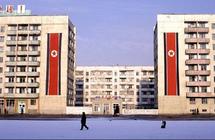Obama warns North Korea a 'grave threat'
Stephen Collinson
WASHINGTON, Stephen Collinson - US President Barack Obama has warned that nuclear North Korea is a "grave threat" and said he would not tolerate the Stalinist state's provocative strategy of extracting rewards with belligerent behavior.
Obama signaled Tuesday an airtight alliance with visiting South Korean President Lee Myung-Bak, after weeks of tensions sparked by North Korea's test of a nuclear device and expectations that another detonation could be on the way.

"Its nuclear and ballistic missile programs pose a grave threat to (the) peace and security of Asia and to the world."
Obama offered Kim Jong-Il's reclusive state a way back to "full integration" into the global community through talks, but only if it verifiably dismantled its nuclear programs -- and warned of stern consequences if it did not.
"There's been a pattern in the past where North Korea behaves in a belligerent fashion, and if it waits long enough is then rewarded with foodstuffs and fuel and concessionary loans and a whole range of benefits," he said.
"The message we're sending -- and when I say 'we,' not simply the United States and the Republic of Korea, but I think the international community -- is we are going to break that pattern."
Obama also vowed to defend South Korea and said Washington planned "serious enforcement" of sanctions against the North, a week after the UN Security Council tightened controls on arms shipments involving the hardline state.
And the US president said measures were being discussed with other regional partners involved in six-party denuclearization talks, namely China, Japan and Russia, "to make it clear to North Korea that it will not find security or respect through threats and illegal weapons."
After talks and lunch at the White House, Lee welcomed assurances that his country remains under the US security umbrella and said Obama, who advocates an eventual end to nuclear weapons, made clear it included the US nuclear deterrent.
"This has given the South Korean people a greater sense of security," Lee said.
"We agreed that under no circumstance are we going to allow North Korea to possess nuclear weapons," Lee said.
On the ground in Asia, Inter-Korean relations remained hostile Wednesday amid low expectations of success for a South Korean delegation in North Korea for talks on the future of a jointly-run industrial estate.
Speaking after the summit Obama, Lee had categorically rejected the North's new financial demands for the Kaesong estate as excessive.
But on the major economic issue for Lee on Tuesday, the South's leader said that he and Obama agreed to working-level talks to advance a free trade agreement -- which the US leader had branded as flawed before taking office.
Obama said he was "committed" to advancing the free trade deal but refused to put a timeline on it, admitting that differences remained over exports of US beef and cars to South Korea.
Pyongyang sent east Asian tensions into overdrive last month with its second nuclear detonation, which followed what Washington said was a disguised test of a long-range missile in April.
Obama came to office offering negotiations with the North, but Kim's government has grown ever more defiant.
On Saturday, the North vowed to build more nuclear bombs and start enriching uranium for a new atomic weapons program, in response to the new UN sanctions.
Some analysts have speculated that the saber-rattling is primarily rooted in an attempt by ailing 67-year-old Kim to bolster a succession plan involving his youngest son, Kim Jong-Un.
The United States stations some 28,500 troops in South Korea and more than 40,000 more in nearby Japan, which also has tense relations with Pyongyang.
Lee, a conservative businessman, took over last year and delighted many in what was then George W. Bush's Washington by reversing a decade-long "sunshine policy" under which South Korea put few restrictions on aid to the impoverished North.
There has been growing speculation in Washington meanwhile that North Korea may soon conduct its third nuclear test.
---------------------------------------------------------------------------------------------------------